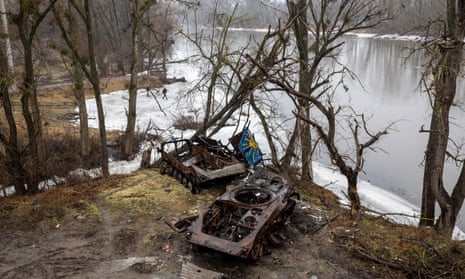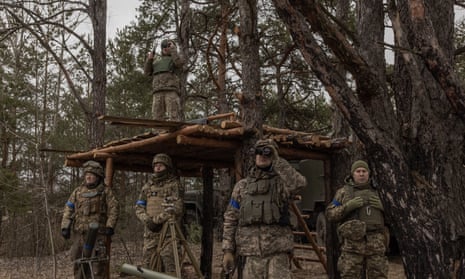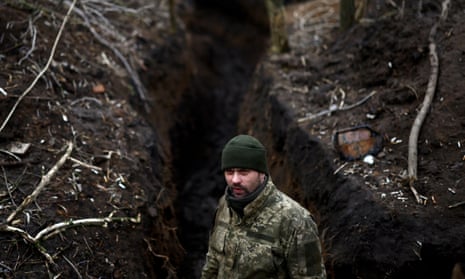Key events
Meanwhile, Ukraine’s head of military intelligence has brushed aside claims that China is considering furnishing arms to Russia, telling US media that he saw no “signs that such things are even being discussed”.
Senior US officials voiced concerns that they were “confident” China was considering providing lethal equipment to Moscow.
But when asked about the possibility in an interview with Voice of America published on Monday, Ukrainian military intelligence chief Kyrylo Budanov said:
I do not share this opinion …
As of now, I do not think that China will agree to the transfer of weapons to Russia. I do not see any signs that such things are even being discussed.”
Earlier this month, US secretary of state Antony Blinken aired Washington’s concerns about potential arms shipments in a tense meeting with his Chinese counterpart, and the director of the CIA said on Sunday that he believed Beijing was still weighing the possibility.
Asked specifically about the US assessment, Budanov said: “I am the head of intelligence and I rely, with all due respect, not on the opinions of individual people, but only on facts. I do not see such facts.”
China has more sophisticated technology and resources at its disposal to possibly provide to Russian forces in Ukraine, US department of state spokesperson Ned Price said at a news briefing on Monday.
Price noted the impact of the provision of Iranian-produced drones, or UAVs, has had in Ukraine in targeting civilian sites and energy infrastructure but warned the consequences of Chinese involvement could be “potentially dire and tragic”.
According to a transcript of the press briefing published by the US department of state, Price said:
Now, of course the PRC has at its disposal technology and resources that Iran doesn’t have, and so one could imagine the implications of the provision of significant amounts of lethal assistance. It’s for that reason that we don’t want to see it happen. We’re continuing to warn very clearly about the consequences that would befall Beijing should it proceed down this path.
Ultimately, Beijing is going to have to make its own sovereign decision. Our goal is to see to it that Beijing makes informed decisions … there would be costs and there would be consequences if the PRC were to go down this route.”
China has been ‘anything but an honest broker’ to bring peace, US says
China has “very clearly” taken Russia’s side and has been “anything but an honest broker” in efforts to bring peace to Ukraine, US department of state spokesperson Ned Price said at a news briefing on Monday.
Although China has “attempted to maintain this veneer of neutrality” it has provided Russia with “diplomatic support, political support, with economic support, with rhetorical support”, Price told reporters.
According to a transcript of the press briefing published by the US department of state, Price said:
The PRC has told the world that, essentially, it is not taking a position, but rather it has tried to portray itself as an honest broker.
In word and in deed, however, the PRC has been anything but an honest broker.
Leaving aside the question of lethal assistance – which we don’t believe the PRC has provided yet, but we do believe it is considering – leaving that aside, the PRC has already provided important forms of assistance to Russia, including in the context of its aggression against Ukraine. It’s provided Russia with diplomatic support, with political support, with economic support, with rhetorical support, including by parroting Russia’s dangerous propaganda, dangerous lies, and disinformation on the world stage.”
Price added that he hopes China “begins to use its influence in a constructive way”.
There are countries around the world that, if they sought to bring this war to an end, would have a significant amount of leverage with the Russian Federation, with other key countries.
The PRC certainly falls within that category. But to date, at least, despite the PRC’s protests to the contrary, we have seen them very clearly take a side in this war.”
Price continued:
So if China were serious about seeking to bring an end to this war, it would have influence, it would have leverage over the government in Moscow that we would hope it would use in a constructive way. It does give us pause, concern, that … the PRC has engaged with Russia, including with high-level visits, Wang Yi’s visit to Moscow just within recent days, even while the PRC is not engaged symmetrically with Ukraine.”
As the battles continue to rage across eastern Ukraine, here are some of the latest images to be sent over our newswires today.




Russian forces attempt to close ring around Bakhmut
The military situation is becoming increasingly difficult around Bakhmut, president Volodymyr Zelenskiy said on Monday as many of Ukraine’s battlefields turn to mud and Russian forces attempt to close ring around the eastern Ukrainian town.
Zelenskiy said in his Monday night address:
Bakhmut direction – the situation is getting more and more difficult. The enemy is constantly destroying everything that can be used to protect our positions, to gain a foothold and ensure defence.”
Russia’s defence ministry claimed its forces destroyed a Ukrainian ammunition depot near the town – the focal point of Russia’s advances in eastern Ukraine – also shooting down four Himars missiles and five drones launched by Ukrainian forces.

“The number of enemy personnel is increasing,” Ukraine’s general staff said, adding that six nearby Donetsk settlements came under Russian shelling.
Hanna Maliar, Ukraine’s deputy minister of defence, said Russia is “increasing the intensity of its assaults” using “tactics of exhaustion and total destruction”.
In a Telegram post late on Monday night, she said:
To put it briefly and simply: the situation at the front is complicated. The enemy army is increasing the intensity of its assaults.
The most difficult situation remains in the Bakhmut direction.
During offensive operations, the enemy uses tactics of exhaustion and total destruction.
At the same time, the enemy is suffering significant losses, losing from 600 to 1,000 people daily.”
In the Donetsk region, suddenly warmer weather has softened the frozen ground, turning battlefields into mud. The spring thaw can turn roads into rivers and fields into impenetrable bogs.
“Both sides stay in their positions, because as you see, spring means mud. Thus, it is impossible to move forward,” one Ukrainian commander told Reuters.
Russia is trying to encircle Bakhmut, forcing Ukraine to pull out its garrison. That would give Moscow its first major prize in more than half a year after Russia intensified its attacks on several locations along the front in the east.
The fierce fighting for the industrial city has been the longest-running battle of Russia’s year-long invasion.
Moscow’s troops have made clear, if slow, progress north and south of Bakhmut, attempting to cut off Ukrainian forces inside the ruined city, which once held around 75,000 people.
“Vicious battles are going on there. The command is doing everything it can to stop the enemy from advancing through our territory,” Serhiy Cherevatyi, a spokesperson for Ukraine’s eastern military command, told Ukrainian television.
Summary and welcome
Hello and welcome back to the Guardian’s live coverage of the war in Ukraine. I’m Samantha Lock and this will be the last time I’ll be bringing you all the latest developments as they unfold.
The military situation around Bakhmut, the focal point of Russia’s advances in eastern Ukraine, is becoming “increasingly difficult”, president Volodymyr Zelenskiy has said.
Russian forces appear to be making more strident attempts to close ring around the eastern Ukrainian town as Ukraine’s eastern military command describes “vicious battles” to stop Russian troops from advancing further through the territory.
US officials say China has “very clearly” taken Russia’s side and has been “anything but an honest broker” in efforts to bring peace to Ukraine.
US department of state spokesperson Ned Price made the comments during a news briefing on Monday, claiming China has provided Russia with “diplomatic support, political support, with economic support, with rhetorical support”.
It’s 7.30am in Kyiv. Here’s where we stand:
-
The military situation is becoming increasingly difficult around the eastern Ukrainian town of Bakhmut, president Volodymyr Zelenskiy said on Monday as many of Ukraine’s battlefields turn to mud. “In the Bakhmut sector, the situation is constantly becoming more difficult,” Zelenskiy said in his nightly address. “The enemy is constantly destroying everything that can be used to protect our positions for fortification and defence.” Russia’s defence ministry claimed its forces destroyed a Ukrainian ammunition depot near the town – the focal point of Russia’s advances in eastern Ukraine – also shooting down four Himars missiles and five drones launched by Ukrainian forces.
-
Belarusian anti-war partisans claim to have severely damaged a Russian military aircraft in what an opposition leader has called the “most successful diversion” since the beginning of the war. BYPOL, the Belarusian partisan organisation, said it had used drones to strike the Machulishchy airfield 12km from Minsk, severely damaging a Beriev A-50 airborne early warning and control aircraft (Awacs).
-
China has “very clearly” taken Russia’s side and has been “anything but an honest broker” in efforts to bring peace to Ukraine, US department of state spokesperson Ned Price said at a news briefing on Monday. China has provided Russia with “diplomatic support, political support, with economic support, with rhetorical support,” he added.
-
Russia has given a lukewarm response to a Chinese peace plan to end the war in Ukraine but said it was paying “a great deal of attention” to the detail. Kremlin spokesperson Dmitry Peskov said any initiatives that might bring peace closer were worthy of attention and Beijing’s voice should be heard, but the nuances of the proposal are important and, for now, he didn’t see any signs suggesting a peaceful resolution could be achieved. “Any attempt to formulate theses for reaching a peaceful settlement of the problem is welcome, but, of course, the nuances are important,” Peskov told the Izvestia daily.
-
Russia will not resume participation in the Start nuclear arms reduction treaty with the US until Washington listens to Moscow’s position, Kremlin spokesperson Dmitry Peskov said in remarks published on Tuesday. Russian president Vladimir Putin last week announced Russia’s decision to suspend participation in the latest Start treaty, after accusing the west of being directly involved in attempts to strike its strategic airbases. Peskov told the daily Izvestia in an interview that the “attitude of the collective west”, led by the US needs to change towards Moscow. “The security of one country cannot be ensured at the expense of the security of another,” Peskov said.
-
Alexander Lukashenko, the president of Belarus, is due to visit Beijing on Tuesday for a meeting with China’s president Xi Jinping, in a high-profile trip symbolising the widening gulf between the US and China over the war in Ukraine. Xi’s meeting with Lukashenko, a close ally of Putin, is seen internationally as a sign of where Beijing’s sympathies lie.
-
The US Treasury secretary, Janet Yellen, met with Zelenskiy and other key Ukrainian government officials in a surprise visit to Ukraine to reaffirm Washington’s support for Kyiv on Monday. Following talks with prime minister Denys Shmyhal, Yellen said that the US has provided nearly $50bn in security, economic and humanitarian assistance, and announced another multibillion-dollar package to boost the country’s economy.
-
Poland has announced a joint initiative with the European Commission to trace Ukrainian children who have been abducted and taken to Russia during the ongoing war in Ukraine. The aim of the scheme is to track down the missing children and to “ensure those responsible are brought to justice”, Poland’s EU affairs minister Szymon Szynkowski vel Sęk said. “We need to return the abducted children to Ukraine and punish Russia for its crimes,” Shmyhal said.

